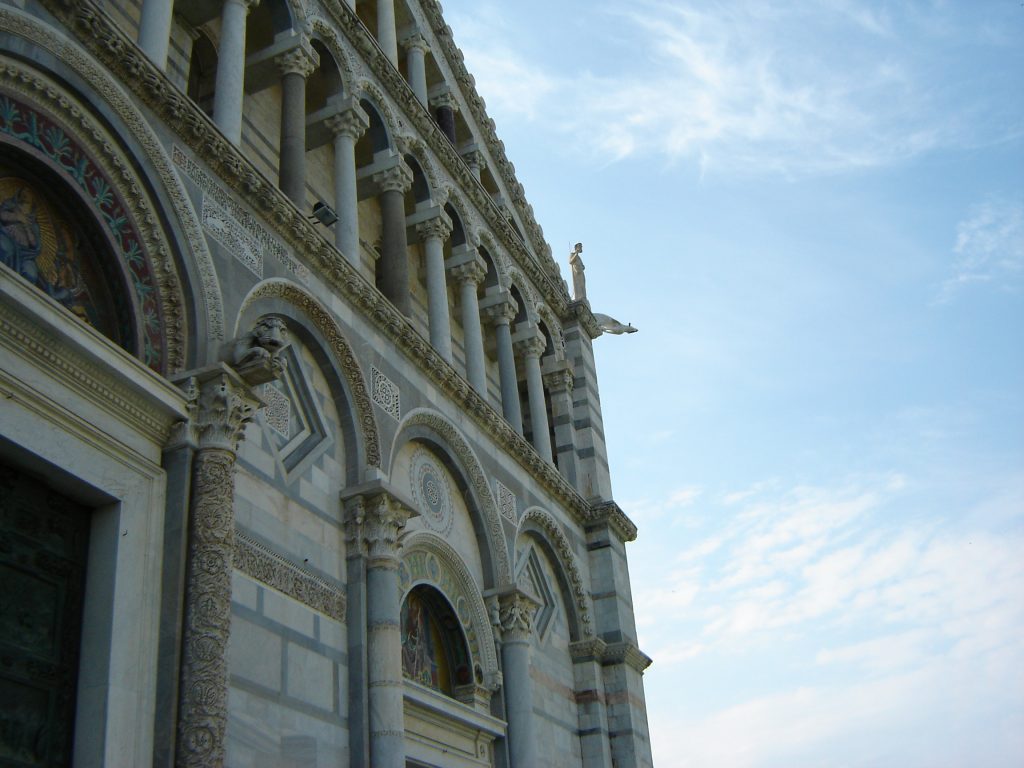
Verse 1 of the Hymn of the Day for the 9th Sunday after Pentecost (Introit Psalm 147:7-11, OT reading Genesis 15:1-6, Epistle Hebrews 11:1-16, Gospel Luke 12:22-34) reads as follows: If thou but trust in God to guide thee and hope in him through all thy ways, He’ll give thee strength whate’er betide thee and bear thee through the evil days. Who trusts in God’s unchanging love builds on the rock that naught can move.
If you just trust in God’s guidance to you, put your hope in him in how you live your life, He will give you strength. Specifically strength for whatever betide you. Betide means what happens to you or what befalls you by fate, or by the evil of this fallen world.
He will hear us through the evil days of this life- all of our days. Who trusts in God’s unchanging love builds on the rock that nothing can move. Neither life nor death nor anything in all creation can separate us from the love of God in Christ Jesus.
If you but trust in God to guide thee… How is your trust? What has befallen you and betided you lately? And how does our faith in Jesus carry us through?
How has trusting God’s promises been going in your life lately? Did listening to the words of our gospel lesson convict you about weight you needlessly carry with you and worries you hold onto- instead of giving them to Jesus?
How about the church as a whole. What things have you seen befall the church in your life time? Have you seen the church shrink? Have you seen from one generation to another where the values of faith are somehow lost in translation- or more specifically lost in the spirit of individualism and abandonment of convention that came with the sexual revolution of the 1960s.
What have you seen befall Christ Lutheran Church as a specific congregation? Can you trust that whatever has betided, befallen, whatever evil has assaulted this congregation- can you trust that Jesus will bear through with his bride the church through whatever happens- that he will ground the church on His perfect unchanging love?
Our scripture readings this Sunday are rich with examples of trust in the Lord’s provision for us:18 Behold, the eye of the Lord is on those who fear him, on those who hope in his steadfast love,19 that he may deliver their soul from death and keep them alive in famine.
28 But if God so clothes the grass, which is alive in the field today, and tomorrow is thrown into the oven, how much more will he clothe you, O you of little faith!
29 And do not seek what you are to eat and what you are to drink, nor be worried. 30 For all the nations of the world seek after these things, and your Father knows that you need them. 31 Instead, seek his kingdom, and these things will be added to you.
With so many convincing statements of God’s provision how could we ever worry again. Yet as sure as the sun will rise we are likely to worry nonetheless. Our gospel reading from Luke chapter 12 and the more familiar close parallel in Matthew chapter 6:25 are especially clear in all of scripture in teaching that worry is from a lack of trust in God’s provision.
Some of us worry more than others- but in truth those who worry more may not be less committed to their faith. I remember times in my life when as much as I read the promises of God, a certain amount of worry about things out of my control in the future would still nag at me.
What will it actually take for us to cast aside worry? Do we just need to be like Abraham and simply have faith no matter what? But what does it mean to have faith like Abraham, does it mean that we likewise need to believe in impossible promises such as a child in advanced age?
Our Lutheran confessions have plenty to say about the meaning of Abraham’s trusting in God’s promises. They answer the question of why Abraham is the hero of our faith, because “In hope he believed against hope.”
The Formula of Concord states about Abraham’s faith: “When the promise of the blessed seed Isaac was given to him, Abraham honored God’s truthfulness. He confidently concluded and believed that what God promised He could also do, although it appeared impossible to his reason. So also about Isaac’s sacrifice he understood and believed God’s Word and command plainly and simply, as they read according to the letter. He committed the matter to God’s almighty power and wisdom, which he knew has many more modes and ways to fulfill the promise of the Seed from Isaac than he could comprehend with his blind reason.”
As great as Abraham’s faith appears to us- it is all a gift of God. The Apology of the AC confesses: “For faith justifies and saves, not because it is a worthy work in itself, but only because it receives the promised mercy. It is a work of the Holy Spirit in which we are freed from death and terrified minds are encouraged and brought to life.”
Abraham’s faith was not a work but a clinging onto the promises of Christ. Trusting the promise is faith. This faith is accounted to us as righteousness. Trusting in Christ- holding onto Christ for dear life. As many of you know our sister in Christ Mary was called to the Lord yesterday morning. In those last days, lying in bed strength gone at an advanced age- what else can a Christian do but wait in hope for the promises of Christ- looking to him for salvation- for the resurrection on the last day.
At the end of life there is no option to help one more person or accomplish one more thing in life in hope. At the end of life there is nothing anyone could hope in other than Christ.
In Christ the promises of our faith should not sound impossible to us. Christ has already risen from the dead- what He does for his children is now hardly impossible to imagine.
Why do we still worry when we hear certain scripture passages? I believe the answer is that we only hear the words of the message ‘don’t worry, don’t be anxious at first glance of hearing those words of comfort. Our ears are listening for the results we want in order to feel better.
But as long as we pay attention to the whole process- to what Jesus has done for us, and to why he promises to provide for us- we shall worry very little indeed. As long as we hear not just the words ‘have faith it will be ok’- but instead meditate on the content of that faith- our Lord Jesus Christ- who is the victor over death and the grave, then we shall truly have reason for comfort!
“Fear not Abram, I am your shield; your reward shall be very great.” -Like a shield the Lord is in front of the believer- protecting and defending believers from enemies of all kind.
Jesus is our shield who goes before us and bears all of our infirmities on himself so that we are not struck with judgement. As a shield Jesus bears the full brunt of all of our challenges so that we can never be over taken by the evil one.
Have you ever tried to do things so well that you begin to get frustrated when things don’t go as you would like? Working hard and putting our best into things can be a satisfying experience. The things we do well may even give glory to God, but they do not save us.
Perfectionism is a common struggle in American culture – attaching undue personal significance to how well we do things, to the point we feel as if our reputation and identity is on the line- almost as if we thought our salvation was riding on how well we do things- as if our hard work is the shield that protects us against all that can go wrong in life and all dangers as well.
How different it is when we see our salvation as entirely grounded in what we cannot control ourselves- in what Jesus does for us. Faith is a total surrender to the promises of God.
In the Introit we hear how our surrender to God is what delights God, not our own strength: 10 His delight is not in the strength of the horse, nor his pleasure in the legs of a man, 11 but the Lord takes pleasure in those who fear him, in those who hope in his steadfast love.
Like Abraham trusted in what he could not immediately see, we walk by faith not by sight. We trust in what God promises to us- not what we can arrange for ourselves. The king is not saved by his great army, a warrior is not delivered by his great strength.
We wait for the Lord, he is our help and our shield. It is easier to believe as the world does in the strength of the horse or the might of man. Many mainline protestant denominations champion the social causes of our day at this point in time more than they care about God’s Word. Essentially they are believing in the might of man over God’s Word.
To be popular and agreeable as a church to our culture is a dangerous temptation. It leads to a path of believing social justice issues are the means of your justification. If you care about those who are disadvantaged and downtrodden- you have to figure God must be on your side and will save you.
Abraham demonstrates an example of a different type of trust. Trusting the impossible promises of God. Promises that contradict our human reason such as having more descendants than stars in the sky, or having the gift of a son in the most advanced of age in life.
God’s Word for us this week helps us to see that God’s promises remain, that his church will endure not through gimmicks and efforts we make to portray the church as just as comfortable and self affirming as our culture. Not through a more contemporary way to relate to our culture- but through the message of His Word- Through the promise “If you but trust in God to guide thee.”




